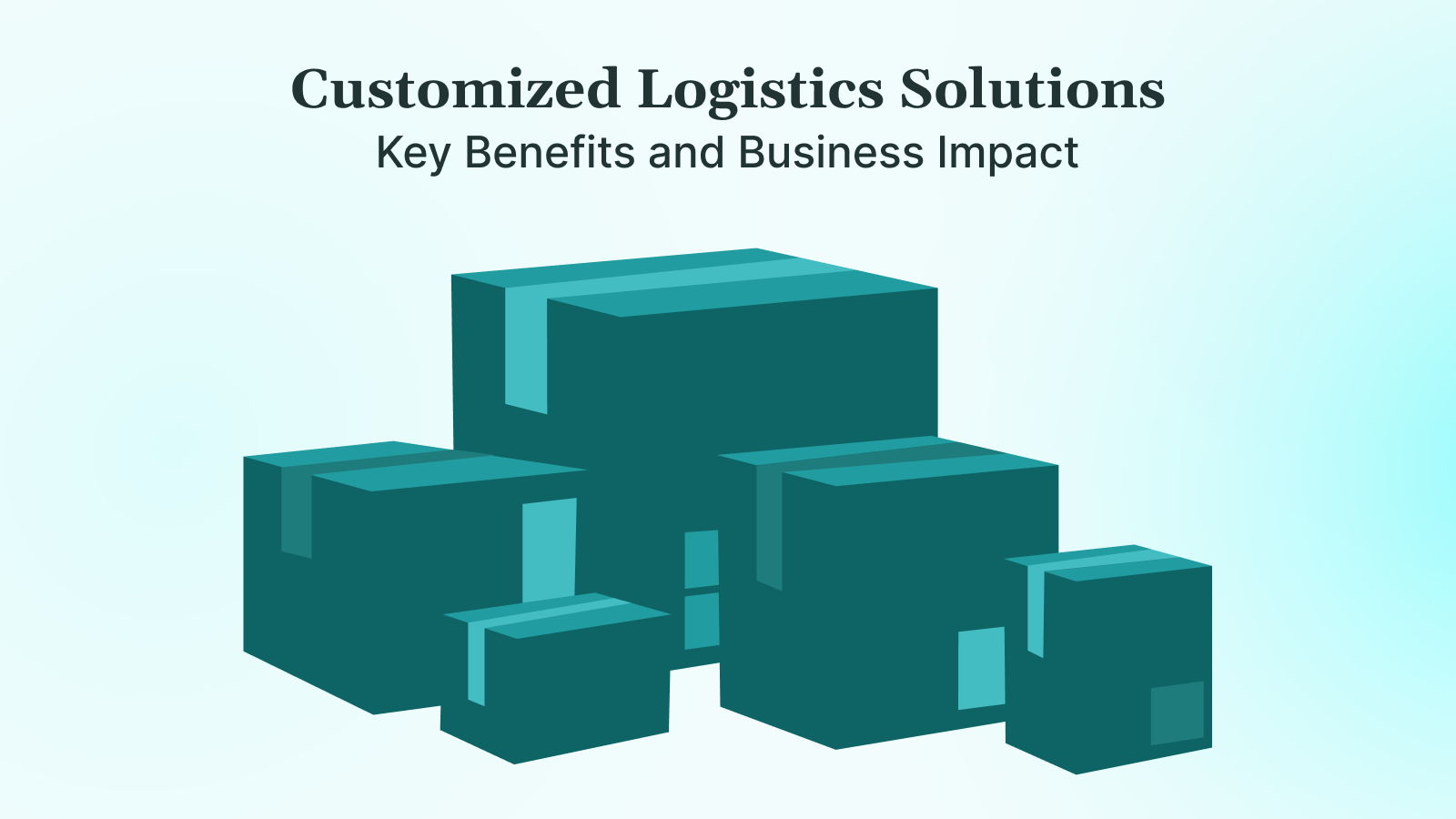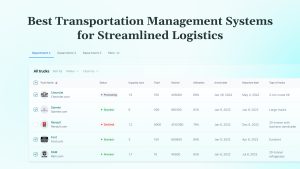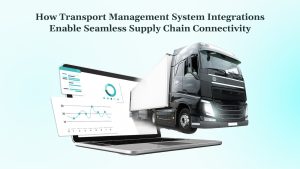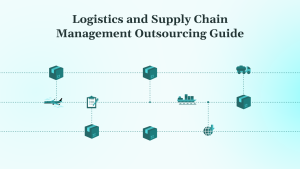Modern logistics systems are under pressure. Businesses face ongoing challenges, including managing inventory, dealing with unpredictable delays, and rising operational costs. Off-the-shelf logistics platforms often fail to adapt to the way companies operate, resulting in blind spots and inefficiencies.
Custom-built logistics solutions are changing that. Designed around specific workflows, they reflect how your operations truly function. Companies that deploy tailored systems report faster order processing and a significant drop in operating costs within the first year.
This guide explains what custom logistics solutions are, the business advantages they offer, and why they are a smarter fit for companies with complex or evolving supply chain needs.
Key Takeaways
- Custom logistics solutions are tailored to your specific workflows, integrating deeply with internal systems to minimize delays, reduce costs, and enhance decision-making.
- Operational benefits include faster order processing, lower shipping costs, and real-time inventory synchronization, driving efficiency across the entire supply chain.
- Scalability and adaptability are built in. Modular architecture and flexible workflows allow your systems to grow with the business without disruption.
- A competitive edge is achieved through faster fulfillment, advanced analytics, customer-focused features, and compliance automation.
- DEVtrust helps businesses build logistics platforms that integrate, scale, and support long-term performance goals.
What Are Customized Logistics Solutions?
Customized logistics solutions represent purpose-built software systems designed to address the specific operational needs of individual businesses. These systems align with existing business operations and support customized workflow needs. They also follow the rules and standards of each industry.
These systems encompass various components, including transport management systems (TMS), warehouse management systems (WMS), real-time tracking capabilities, and automated reporting tools. Custom systems support features such as managing different transport modes, adjusting routes based on traffic, and forecasting demand using historical trends.
Custom logistics systems often connect with ERP, CRM, and third-party tools. This ensures data consistency across operations and enables the setup to adjust as business needs change. High-end custom systems utilize tools such as sensors to track cargo, intelligent algorithms to prevent breakdowns, and secure ledgers to indicate the location of goods. These features help businesses run more efficiently while maintaining control.
What Is the Role of a Customized Logistics Solution in Your Business
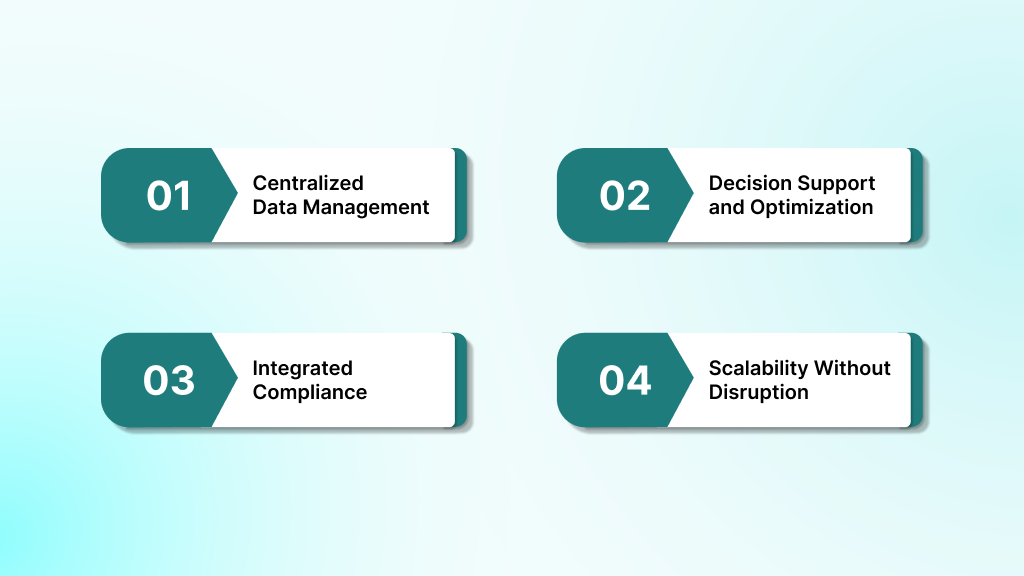
Customized logistics solutions function as the operational core of your supply chain. They replace fragmented processes with coordinated, data-driven workflows that align with real business needs.
Key roles include:
- Centralized Data Management: Custom systems gather data from suppliers, carriers, warehouses, and customer interfaces into a single, unified dashboard. This eliminates silos and improves visibility across all logistics operations.
- Decision Support and Optimization: These platforms analyze historical trends, current performance, and market conditions to recommend shipping routes, carrier choices, and inventory allocations.
- Integrated Regulatory Compliance: Built-in logic supports compliance with industry-specific regulations, including hazardous materials handling, cross-border documentation, and shipping certifications. This reduces manual work while ensuring accurate execution.
- Scalability Without Disruption: Modular design enables the system to grow in tandem with your business. Adding new shipping zones, product categories, or service tiers is possible without requiring a complete overhaul of the entire platform.
Benefits of Customized Logistics Solutions
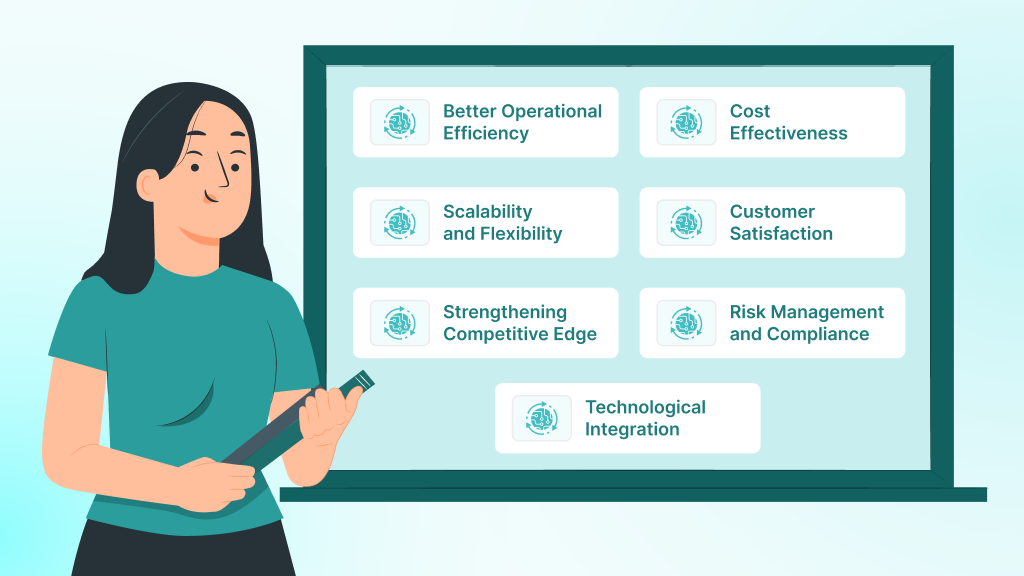
Customized logistics solutions deliver measurable business advantages that extend far beyond basic shipping and tracking capabilities. These systems create competitive advantages through operational optimization, cost reduction, and enhanced customer experiences that directly impact performance.
The following benefits demonstrate how tailored logistics platforms transform business operations across multiple dimensions:
Enhancement of Operational Efficiency
Customized logistics solutions enhance operational efficiency by eliminating process delays, reducing manual workload, and consolidating core logistics functions into a single, responsive system. They deliver measurable gains through:
- Automated order processing cuts fulfillment time by up to 40%. The system selects the best carrier based on package size, location, and delivery urgency while also automatically generating shipping labels and tracking data.
- Real-time inventory synchronization that adjusts stock levels automatically using reorder triggers and demand forecasts. A manufacturer, for instance, can adapt production schedules in response to real-time inventory data across its distribution centers.
- System-wide integration that eliminates redundant data entry and ensures information consistency. Custom APIs link logistics platforms with ERP systems, accounting tools, and CRM platforms to create a single source of operational truth.
Cost-Effectiveness
Customized logistics solutions reduce operational costs by optimizing resource allocation, minimizing administrative overhead, and enabling more informed logistics decisions throughout the supply chain. They achieve this through:
- Dynamic rate shopping compares real-time prices across carriers and service levels to choose the most cost-effective shipping method for each order. Companies using this feature often reduce shipping costs within six months.
- Inventory optimization algorithms that maintain ideal stock levels by analyzing seasonal trends and real-time demand. For example, a retail brand cut inventory holding costs while improving product availability through predictive restocking.
- Automated documentation and reporting that eliminate manual admin work. The system generates compliance reports, operational summaries, and financial dashboards without dedicated staff, reducing administrative costs.
Scalability and Flexibility
Custom logistics solutions provide businesses with the flexibility to scale and adapt without necessitating significant operational changes. As supply chains grow or shift, these systems evolve in tandem with the company without creating downtime or complexity.
- Modular Expansion Across Markets and Services: The architecture supports feature-by-feature upgrades. Businesses can integrate new carriers, expand into international markets, or add fulfillment options without disrupting existing logistics flows.
- Elastic Infrastructure for Volume Spikes: Cloud-native systems scale resources automatically as demand increases. During peak seasons or campaign-driven surges, performance remains stable without requiring manual intervention or added infrastructure.
- Configurable Workflows That Grow with You: Operational rules, like shipping priorities, compliance checks, or approval paths, can be modified by internal teams as needs change. No code updates or reengineering cycles are required.
Enhanced Customer Satisfaction
Customers expect more from logistics than just on-time delivery. They want accurate updates, flexible options, and quick resolutions when things go wrong. A custom logistics system makes that possible at scale.
- Real-Time Tracking and Notifications: The platform shares live shipment status and sends automatic alerts for order confirmations, delays, and arrivals. This keeps customers informed without adding pressure on support teams.
- Flexible Delivery Options: Businesses can tailor delivery schedules, offer alternate drop-off points, and support special handling needs. A furniture retailer using these features improved customer satisfaction scores by 31% through precise delivery windows and white-glove service.
- Proactive Issue Resolution: The system monitors routes, weather, and carrier behavior to detect delays early. When problems are likely, it adjusts logistics plans or updates customers before the issue becomes visible.
Strengthening Competitive Edge
Custom logistics solutions provide businesses with a measurable edge by enabling faster service models that competitors cannot easily replicate. This strategic advantage helps companies win on both speed and precision.
- Faster Fulfillment, Smarter Allocation: With optimized routing and automated decision logic, businesses can offer same-day or next-day delivery across key markets. Smart inventory allocation reduces shipping time and costs by aligning stock distribution with demand zones, thereby optimizing supply chain efficiency.
- Live Operational Intelligence: Custom platforms provide live dashboards and in-depth analytics across the entire logistics chain. Teams gain visibility into delays, cost drivers, and service quality, allowing for faster adjustments than competitors who are locked into generic systems.
- Differentiated Service Models: Unique offerings become possible when the platform is tailored to specific needs. A specialty chemical company, for instance, has deployed temperature-controlled logistics with continuous tracking, creating a clear advantage in the delivery of regulated products.
Risk Management and Compliance
Customized logistics solutions reduce exposure to regulatory violations and operational breakdowns by embedding risk controls into core logistics workflows. With early alerts and built-in compliance checks, businesses can address issues before they disrupt operations.
- Built-In Compliance Verification: Custom systems validate shipment contents, documentation, and carrier credentials against regulatory standards, covering requirements such as hazardous material handling, international shipping, and industry-specific protocols before fulfillment begins.
- Proactive Risk Monitoring: Real-time data from weather sources, carrier systems, and geopolitical tracking enables the early detection of potential disruptions. One global manufacturer receives alerts up to 72 hours in advance, enabling preemptive adjustments that keep their supply chains running smoothly.
- Comprehensive Audit Trails: The system logs every action, change, and approval automatically to support audits and internal reviews. These records not only meet legal requirements but also provide insight into process inefficiencies and areas for improvement.
Technological Integration
One of the most significant advantages of customized logistics solutions is the ability to integrate advanced technologies directly into operations. These capabilities enable faster decisions, better control, and long-term adaptability across the entire supply chain.
- Predictive Intelligence with AI and ML: Custom solutions use artificial intelligence to analyze performance data and recommend the most efficient shipping routes and delivery schedules. Over time, the algorithms learn from outcomes and continuously improve logistics decision-making.
- Visibility with IoT: IoT sensors track temperature, humidity, location, and handling conditions across shipments and warehouse environments. This live data helps teams maintain product quality, monitor fleet performance, and plan proactive maintenance before disruptions occur.
- Data Integrity with Blockchain: Blockchain integration creates secure, tamper-proof records of every transaction in the supply chain. It enhances transparency between partners and ensures that critical logistics data remains consistent, traceable, and protected throughout all stages of delivery.
How Custom Logistics Solutions Are Different from Off-the-Shelf Systems
Custom logistics solutions and off-the-shelf systems represent fundamentally different approaches to addressing logistics operational requirements. The choice between these options has a significant impact on long-term business performance, operational flexibility, and competitive positioning.
Below is the comparison that highlights the critical differences between custom and off-the-shelf logistics systems:
| Aspect | Custom Logistics Solutions | Off-the-Shelf Systems |
| Deployment Time | 3–6 months, with phased implementation | 1–2 months, using standard configurations |
| Investment Model | Higher upfront cost, Long-term ROI | Lower initial cost, recurring license fees |
| Fit to Operations | Aligned with exact business workflows | Requires teams to adapt to fixed features |
| Scalability | Modular, built to grow with business needs | Limited by the vendor’s upgrade roadmap |
| System Integration | Full integration with internal and third-party tools | Partial or restricted integration options |
| Customization Control | Fully customizable by design | Limited tweaks allowed by vendor constraints |
| Support and Maintenance | Dedicated team with product knowledge | General support with minimal business context |
| Regulatory Compliance | Industry-specific rules built in | Basic coverage, often requiring manual effort |
| Performance Tuning | Optimized using real usage data | Static setup based on assumed workflows |
| Data Ownership | Complete control and data portability | The vendor holds data under a shared environment |
| Long-Term Adaptability | Evolves with technology and business goals | Bound to the vendor’s product roadmap |
Custom logistics solutions excel in businesses with unique operational requirements, complex compliance needs, or strategic differentiation goals. These systems provide the flexibility and control necessary to create competitive advantages through superior operational capabilities.
Off-the-shelf systems serve businesses with standardized logistics needs, limited customization requirements, or immediate implementation priorities. While these solutions offer faster deployment, they often require significant process adaptation and provide limited competitive differentiation.
Why the Right Development Partner Matters
Custom logistics software is deeply integrated into your business’s day-to-day operations. From inventory movement to customer delivery expectations, every workflow depends on systems that are stable, efficient, and built with operational realities in mind.
It involves building systems that align with logistics operations and adapt as your business evolves. A development partner must understand how to translate complex logistics needs into software that works reliably and scales without disruption.
That level of technical and operational alignment does not come from generic software vendors. It requires a team that collaborates closely with your internal stakeholders, understands your infrastructure, and builds for the long term.
DEVtrust brings that approach to every custom engagement. With a strong foundation in backend systems, cloud architecture, and API-based integrations, their engineers create platforms that are not only functional but operationally intelligent. Their approach is reflected in case studies of logistics projects built to solve real operational challenges:
- A Toronto-based courier company needed real-time tracking, cost estimation, and dispatch management. DEVtrust delivered an end-to-end solution integrated with Google Maps and Tookan API.
- For a Draydex operator, they built a rate management system with instant pricing, real-time data, and embedded mapping to streamline freight rate workflows.
- A field service app required accurate arrival estimates and automated customer updates. They created a communication-first mobile platform that improves the client experience.
Each project demonstrates a profound understanding of logistics, complemented by robust engineering expertise. DEVtrust’s strength lies in building platforms that integrate smoothly, scale confidently, and work reliably from day one.
Conclusion
Custom-made logistics solutions give businesses control, visibility, and the ability to scale without compromise. They replace fragmented workflows with systems built around specific operational needs. The result is faster deliveries, lower costs, and better customer outcomes. A well-built platform does more than keep things moving; it turns logistics into a driver of growth and a source of competitive advantage.
DEVtrust helps businesses design and develop logistics systems that integrate, adapt, and perform from day one. Backed by strong engineering and long-term support, their solutions align with real business goals.
Book a consultation to start building your custom logistics platform.
Customized Logistics Solutions: Key Benefits and Business Impact
Boost efficiency & cut costs with customized logistics solutions. Experience scalability, customer satisfaction & enhanced service quality. Learn more now!
Contact Us